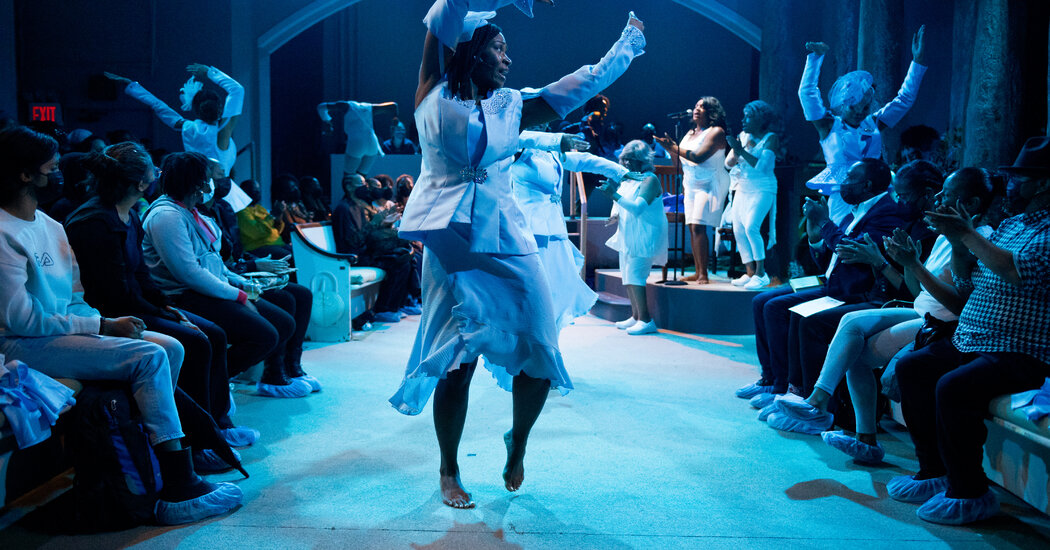Over 75 minutes, these women run through a 17-part liturgy accompanied by a pianist (Darnell White) and singer (S T A R R Busby, whose resonant voice leads the joyous gospel numbers). At one corner of this church stands a partially obscured forest. A silent spirit in white occasionally dances out from this surreal fantasy space (scenic design by dots), flitting around in fluid swells of movement. This is the Ancestor (Satori Folkes-Stone, magnetic), who also performs offstage rituals as part of the service. Another young woman, called Free (a less graceful Amara Granderson), is the one wondering whether this is a church, and if she even belongs here.
Like “What to Send Up When It Goes Down,” by Aleshea Harris, “(pray),” which douglas has nimbly written, choreographed and directed, is theater that demands the audience step into a shared experience of Blackness. In these experimental works, theater begins and ends in community.
Thus, douglas’s script aims to make faith more accessible via coy translations: “ghost” becomes “most,” for example, and “hallelujah” is “yahleloo.” The similar sounding words with the music (composed by Busby and JJJJJerome Ellis) trick the ear into fluency, so that a prayer that says “O, abundance! May I meet you. May I know you,” feels as true and traditional as, say, the Apostles’ Creed.
The Sisters deliver improvised gossip and judgmental comments, sometimes, hilariously, at the audience’s expense. The cohesiveness of their vocals and group movements (a stunning mélange of styles, including hip-hop and Afro-Cuban) recalls the deft cast of performers in Ars Nova’s 2022 hit by Heather Christian, “Oratorio for Living Things.” Each Sister sings with her own textured affect, so the psalms they perform feel creased, pleated or smoothed over like fabric. Tina Fabrique’s elastic bellows electrify “A Song (For to Ease My Troubled Mind).” Another Sister Anna (Ariel Kayla Blackwood) spits Noname lyrics atop a muscular beat. (Mikaal Sulaiman’s ethereal sound design lifts the voices higher.)
A whole syllabus of thinkers and artists have inspired (and are referenced in) douglas’s script, including the poets Tyehimba Jess and Raych Jackson. But douglas’s writing sometimes pales in comparison, lacking the same polish and panache. And there are some missed notes: “(pray)” feels more anchored within the distant and recent past, lacking firmer context in the present, and despite the production’s inclusive language around gender, queerness is only occasionally alluded to. The history of race-based attacks on Black churches, like the 1963 Birmingham bombing and the 2015 Charleston shooting, is artfully hinted at with the haunting sound of a helicopter overhead, but feels like a footnote.


